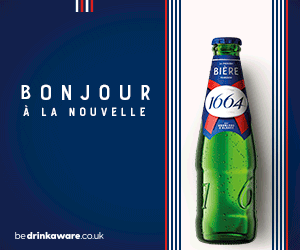Feature: Are Udon?

The last few months have been a whirlwind of new openings for Japanese restaurant brand Marugame Udon. In between busy daily service times and new venue launches, Keith Bird – group CEO for Europe – found time to sit down with Dine Out editor Genna Ash-Brown, to discuss the chain’s impressive expansion strategy
Asian fare is just as vast and tantalising as the huge and diverse region from which it derives. From the punchy to the fragrant, the spicy to the sour and the preserved to the slow cooked, dishes produced across the continent are also a big deal in the UK. Today, the Asian restaurant segment holds a £7bn market share of the industry nationwide (IBISWorld).
With recipes as rich and varied as the nation’s history and culture, Japanese menus are highly sought-after among consumers keen to explore the world through their taste buds, and Japanese-centred concepts hold a chunk of the market worth a sizable £1bn. Sushi, yakitori, donburi, tempura – these are just some of the nation’s most popular and recognisable dishes. And while noodles, in all their interpretations, are rife across the continent, udon is a typical base for noodle dishes in Japan.
“I was recently watching Pointless – very high-brow stuff – and a question was: which of these noodles are Japanese?” says Keith Bird, Europe CEO of Marugame Udon – a Japanese restaurant brand that’s going for gold in its expansion across the UK. “Udon was an answer, but only 8% even knew it was a type of noodle. It’s a lesser-known product here, which means we actually have something in our name that not everyone knows about.”
But with the company recently announcing its ambition to establish 150 kitchens across Europe by 2027, this could be the brand bold enough to bring udon to the masses.
An enticing offer
So, what category does Marugame Udon occupy? Well, according to Bird, the brand really falls into a space of its own. “With fast-casual, you think of somewhere like Five Guys and their ticket price starts at £18 on average. Even Nando’s can be £15 plus,” he explains. “We’d like to give a more enhanced experience than those brands and, in the design and execution, I think we do. Our average sits somewhere around the £12 mark, which I think probably makes us value fast-casual. A big part of hospitality is knowing what you’re about – we are value.”

Marugame Udon recently launched a breakfast menu at some venues
The brand itself is bright, vibrant and inherently digital. Venues are adorned with eye-catching screens that guide diners through their self-service journey, offering things like allergen information, menus and useful tips on how customers can create a delicious dish personalised to their tastes. Bird tells me that, since many in the UK are not yet familiar with the Marugame Udon offer, the group’s decision to heavily invest in digital tools and signage was strategic. With various industry studies pointing to the benefits of digital boards in hospitality – including a 50% increase in customer engagement and a boost in customer satisfaction, as digital menus can decrease wait times by 15%, the choice was smart in more ways than one.
Elsewhere in the venue (speaking of the Oxford Circus branch, specifically) storyboard inscriptions, such as ‘The udon kitchen is a common ground for rich and poor, young and old’, adorn the walls, tying in the brand’s Japanese heritage and message of inclusivity.
Although the udon is made fresh daily, everything is batch prepared so customers can get their meal from the collection point in less than a minute. Shouts of “fresh udon” and “fresh tempura” breathe a busy yet personable energy into the space. “That’s the sort of vibe we want – the shout-outs really add to the sense of theatre,” says Bird. “On top of being speedy and accessible to everyone, we really want to celebrate the joy of something so simple being so tasty.”
Origin story
To keep sight of where you’re going, it’s important to remember where you came from. The roots of Marugame Udon, explains Bird, represents an incredible growth story in itself. “It was started 22 years ago by a man called Takaya Awata,” he says. “His father came from Sanuki, a region in Japan where they have this particular type of food – Sanuki-style udon.”
There are 11 types of udon served across various regions of Japan. Made from just three simple ingredients – flour, salt and water – the greatest distinction between each type of noodle is its shape. Sanuki is the type most commonly served in Japanese restaurants, characterised by its square shape, flat edges and chewy texture (a sensation the Japanese call ‘mochi mochi’).
“Awata opened one udon store and it went really well. So, he just kept opening and opening and opening. Now, there are 850 branches in Japan and 400 internationally.”
Awata remains the group’s president and leader to this day, also heading up nine other brands and 1,700 restaurants worldwide.
“But there is a gap in Europe,” says Bird. “The business tried to make the leap a couple of times and needed some help, which is where I came in.”
Cracking a continent
Bird is a fully trained accountant, but it was during his time as an MBA student that he heard hospitality calling. Tony Hughes, a retiree and hospitality legend, who served as MD of Mitchells & Butlers from 1993–2008, as well as The Restaurant Group (TRG) from 2008–2016, was invited in to address Bird’s programme cohort as a guest speaker. “In his time with TRG, he helped bring TGI Fridays (now just known as Fridays) here, to the UK. Everyone has a story of someone who inspires them. For me, that was him.”
And that was it – his professional path was set. From here, Bird worked his way through some of the biggest names in the industry. He joined Pepsi Restaurants International, which eventually became Yum! Brands, where he supported the growth of QSR models such as Pizza Hut and KFC, which are now household names. “I picked up valuable skills in finance, strategy, marketing and store development. It was an amazing training ground.”
He also served a stint with Walmart, before creating a start-up called Natural Kitchen, which went on to launch nine sites. He was a member of the consulting team that helped coffee chain Costa go global and, when Nando’s acquired Gourmet Burger Kitchen in 2010, he was brought on as CFO, alongside Alasdair Murdoch, former CEO, to turn the brand around. “It taught me a lot about values,” he explains. “Nando’s brand positioning is impressive. Its values are a big part of what makes it so good. They treat people in the same way they expect them to behave, which is how it should be.”

Keith Bird, CEO for Europe, Marugame Udon
In 2020, Bird was selected as the man with the appropriate skills and know-how to bring Marugame Udon to Europe. And with such an impressive resumé, it would be hard to dispute that he’s the right man for the job. “We smashed it in Japan, have gone international and just want to keep going,” he says.
The group’s quest begins with gaining critical mass here, in the UK – and it’s off to a
flying start.
In a matter of weeks, branches of Marugame Udon popped up all over the capital. Nine newly launched sites reside in some of the city’s most sought-after F&B destinations, including The O2, Canary Wharf, Oxford Circus and Waterloo, with restaurants soon to open at The Strand, Liverpool Station and slightly further afield in Reading. Now, the business is at the stage of reaching out to, and has secured, a number of ‘MUMBOS’ (multi-unit multi-brand operators). “We’re talking people like Starbucks and KFC franchisees. Really great professional partners that have similarly ambitious growth strategies. We could do it ourselves, but the reality is that, if you want to make udon for all, then the pace of growth and having franchise partners is really important.
“Our attitude is all about improvement – there’s nothing better. I’ve worked with franchisees before and they help improve the system. That’s what we want: to provide the best possible outcome for customers.”
In five years’ time, Bird expects the group to have firmly carved the Marugame Udon name into the restaurant landscape of five or six countries in Europe. “Some of those will be seeding – like we were here last year, but in France, Germany, Spain, the Netherlands or Italy. As long as you get the foundations right then you can roll out more and more, with the help of the right partners.
“We feel incredibly confident that we’ll get there. We are ambitious but humble – we just want to make sure we’re doing things the right way.”











